Leveraging AI and automation to enhance customer support and retention is crucial for businesses aiming to improve customer experiences and foster loyalty.
In the digital age, AI and automation have revolutionized customer interactions. This article explores how these technologies reshape customer support through personalized interactions and streamlined service delivery.
By examining the benefits, challenges, and best practices, businesses can optimize their customer service operations for better retention and satisfaction.
Article Shortcuts:
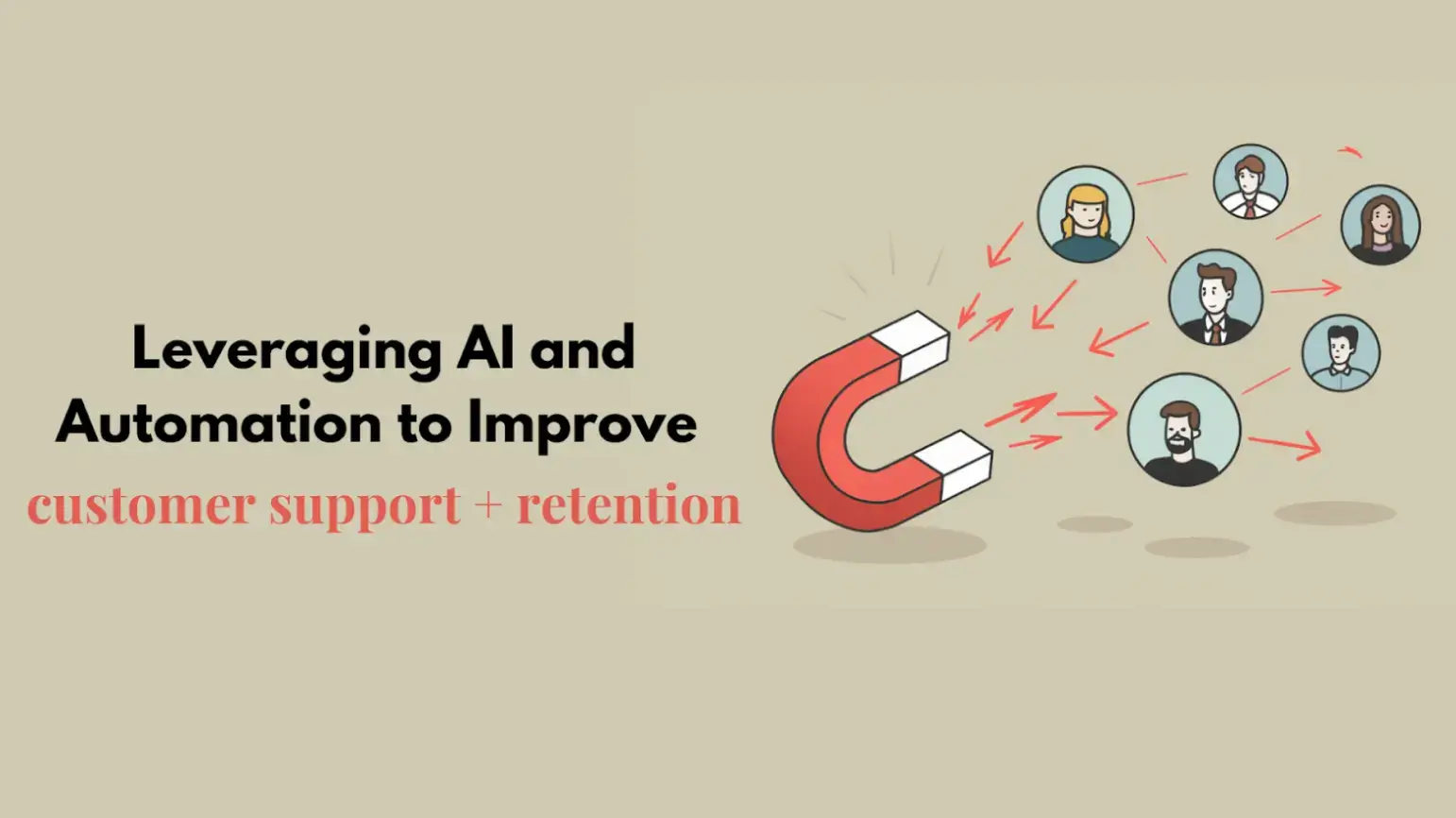
AI and Automation in Customer Support
AI technologies are revolutionizing customer service with faster, personalized, and efficient support. Various types of AI agents are being employed to enhance these capabilities.
Since the early 2000s, advancements in machine learning and natural language processing have enhanced AI capabilities. Modern systems like IBM's Watson and Salesforce's Einstein analyze customer data for tailored responses and predictive support.
Key trends include integrating AI with CRM systems, conversational AI, and AI-driven sentiment analysis.
Companies like Amazon and Netflix use AI for personalized recommendations and better engagement, showcasing AI's potential. Automation and AI now provide seamless customer experiences, replacing traditional methods with innovative solutions.
For example, integrating AI with HR software automates recruitment and enhances employee training. Similarly, AI-powered chatbots in banking handle customer inquiries 24/7, and in healthcare, AI analyzes patient data for personalized treatment plans.
The implementation of AI in logistics and transportation optimizes delivery routes and manages customer service inquiries about shipment tracking and delivery schedules.
-
Enhancing Customer Service Efficiency with AI Technologies
AI is revolutionizing customer service by automating routine tasks and providing predictive support.
AI-powered systems, like chatbots and virtual assistants, instantly handle tasks such as password changes and order tracking using natural language processing (NLP). This reduces response times and allows human agents to tackle more complex issues.
Additionally, AI's predictive capabilities analyze customer data to anticipate needs, with tools such as liveness detection ensuring secure and authentic interactions in real-time. Machine learning algorithms identify patterns, enabling proactive support.
For instance, AI can predict potential product issues based on usage and suggest preventive measures. This proactive approach enhances customer satisfaction by providing timely and relevant solutions.
Key Benefits and Applications
- 24/7 Availability and Scalability: AI chatbots offer round-the-clock support, handling multiple queries simultaneously to manage peak times efficiently.
- Consistency and Cost Efficiency: Automated responses ensure accurate information delivery, reducing operational costs and minimizing human error.
- Integration with CRM Systems: Seamlessly integrates with CRM tools to access comprehensive customer data for personalized interactions.
- Continuous Improvement and Customer Insights: AI systems learn over time, improving their ability to handle complex queries and provide valuable insights into customer behavior.
- Practical Applications: Implementing AI-driven live chat, predictive maintenance, sentiment analysis, and personalized recommendations to enhance overall customer experience.
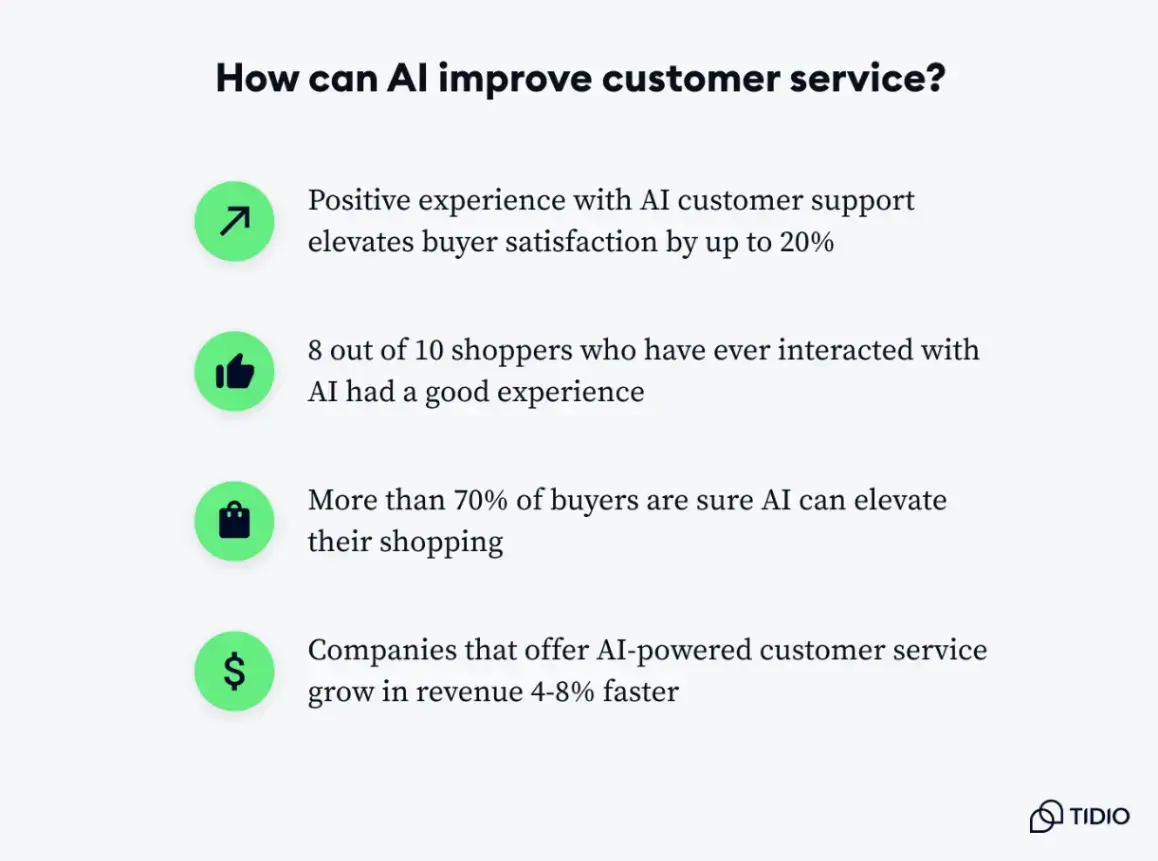
Source: TIDIO
-
Personalizing Customer Interactions through Automation
AI customizes customer interactions by analyzing data to provide personalized responses and recommendations.
For example, Netflix recommends shows based on viewing habits, and Amazon suggests products tailored to user preferences. Additionally, AI tailors support channels to customer preferences, whether via email, social media, or other platforms.
This ensures seamless, multi-channel support, enhancing convenience and satisfaction. AI-driven chatbots offer instant, consistent assistance, acting like a personal concierge for all communication needs.
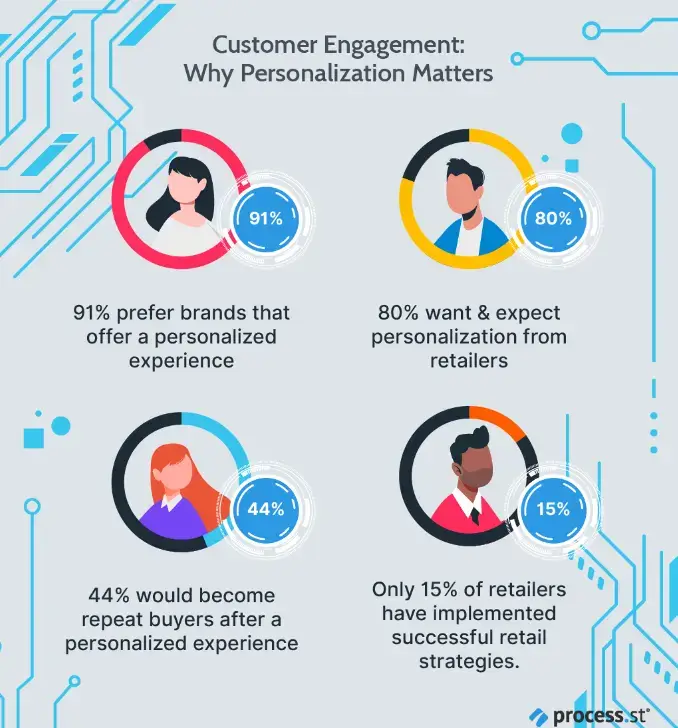
Source: Process
Key Examples of AI-Driven Personalization
- Netflix: Recommends movies and shows based on individual viewing habits and preferences.
- Amazon: Suggests products based on past purchases and browsing history.
- Spotify: Curates personalized playlists and song recommendations based on listening behavior.
- Sephora: Uses AI to offer personalized beauty product recommendations through its Virtual Artist tool.
- Starbucks: Customizes marketing messages and promotions based on customer purchase history and preferences for mobile app monetization.
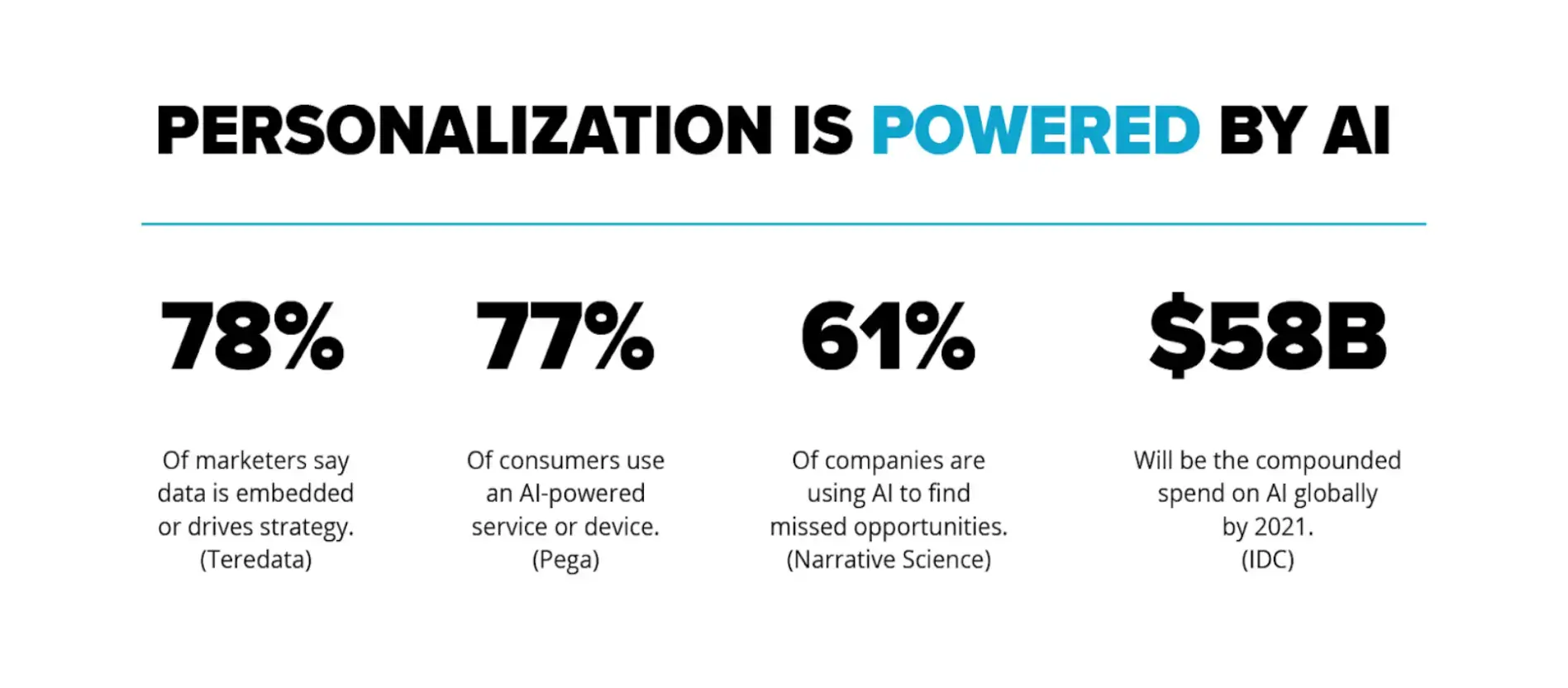
Source: softserve
Multi-factor authentication (MFA) offers an increased layer of security. It requires users to provide two or more forms of identity verification before granting them access to a network, website, or application.
-
Streamlining Support Processes with AI Chatbots
AI chatbots and data analytics are transforming customer support and retention strategies.
By integrating AI technologies, businesses can offer 24/7 customer assistance and gain deep insights into customer behavior to enhance retention efforts.
Leveraging the best ChatGPT apps allows companies to deliver personalized, conversational experiences that elevate customer satisfaction and engagement.

Source: TIDIO
Integrating Chatbots for Instant Customer Assistance
- 24/7 Availability: AI-powered chatbots are available round the clock, providing immediate assistance even when human agents are unavailable. This ensures that customer queries are addressed promptly, reducing wait times and improving customer satisfaction.
- Multi-Channel Support: Chatbots can be integrated across various platforms, including websites, mobile apps, and social media, offering consistent support wherever customers choose to interact.
Training Chatbots for Seamless Interactions
- Natural Language Processing (NLP): Advanced NLP enables chatbots to understand and respond to customer inquiries naturally, making interactions feel more human-like.
- Continuous Learning: Machine learning algorithms allow chatbots to continuously improve their responses by learning from previous interactions. This ensures that the quality of support improves over time.
Leveraging AI to Improve Customer Retention
AI is transforming customer retention by enabling faster, more personalized, and efficient services. Now, with AI integration services enabling predictive analytics, businesses can identify customers at risk of churn and implement targeted retention strategies.
Traditionally, customer retention relied on reactive measures and broad marketing campaigns. Now, AI-driven predictive analytics can identify customers at risk of churn, allowing for targeted retention strategies.
For instance, Amazon uses AI to analyze purchasing behavior and provide personalized recommendations, enhancing customer loyalty. This shift underscores the importance of integrating AI into retention strategies to maintain strong, long-term customer relationships.
Effective Amazon product ads management can further personalize customer recommendations, increasing engagement and loyalty.
-
Enhancing Customer Retention Efficiency with AI
Incorporating AI into customer retention strategies is revolutionizing how businesses maintain strong, long-term relationships with their customers. AI not only automates routine tasks but also predicts customer needs, leading to more proactive and personalized support.
Key Strategies for Enhancing Customer Retention with AI:
- Automating Routine Tasks:
- AI efficiently handles routine tasks such as password changes and order tracking.
- This reduces wait times and enhances customer satisfaction by providing instant solutions.
- Technical Aspect: AI chatbots and automated response systems can be integrated into customer service platforms to handle repetitive inquiries.
- Predictive Customer Support:
- AI analyzes past interactions and behaviors to predict customer needs, such as Easy AI and its HelpDesk Assistant.
- Businesses can proactively address potential issues before they escalate, improving the overall customer experience.
- Technical Aspect: Machine learning algorithms and predictive analytics tools can be employed to analyze customer data and identify patterns indicating potential churn.
-
Leveraging Data Analytics for Customer Retention
In today's competitive market, leveraging data analytics is crucial for customer retention.
By analyzing customer behavior, businesses can uncover patterns and gain insights into preferences and pain points, aiding in the development of effective retention strategies.
Here are key points on using data analytics for improving customer retention:
- Analyzing Customer Behavior: Utilize data analytics tools to examine customer interactions and transactions, identifying trends and patterns for more personalized retention efforts.
- Predictive Analytics for Churn Prediction: Implement AI-driven models to forecast which customers are at risk of leaving, enabling proactive intervention and targeted retention strategies.
- Personalized Retention Tactics: Use insights from data analytics to customize retention strategies, including tailored communication and personalized offers.
- Continuous Monitoring and Improvement: Establish a system for ongoing analysis of customer data, regularly updating predictive models and refining retention initiatives based on new data.
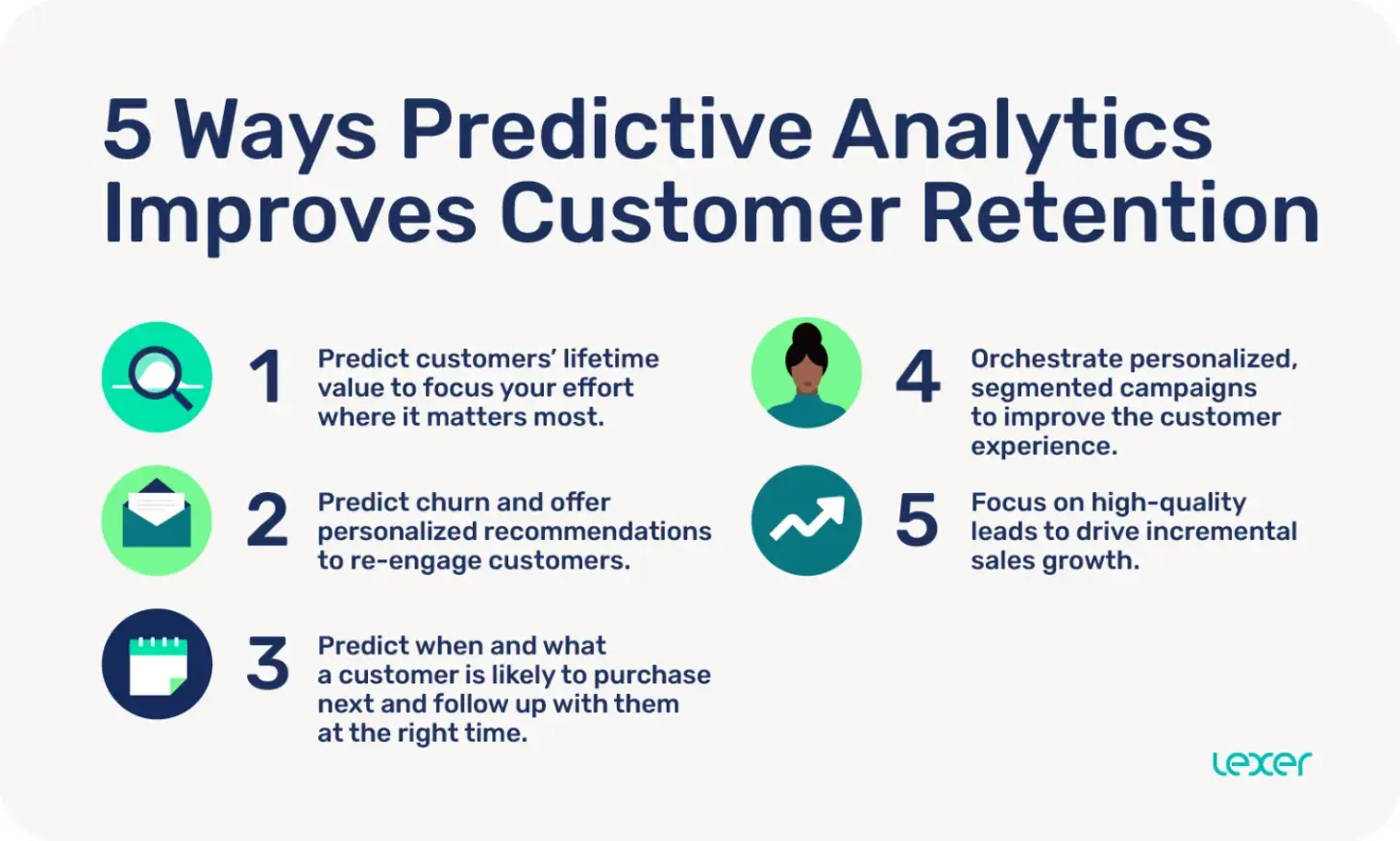
Source: Lexer
Integrating these aspects of data analytics into customer retention strategies helps businesses understand their customers, anticipate needs, and foster long-term loyalty.
For example, Netflix recommends shows based on viewing history to keep users engaged, while Starbucks personalizes marketing campaigns and loyalty rewards, enhancing customer retention.
-
Automating Customer Engagement Strategies
Automating customer engagement with AI enhances the effectiveness and personalization of interactions, fostering stronger customer relationships.
Key Strategies
- Automated Outreach: AI automates email campaigns, ensuring timely, personalized communication. For example, AI can segment customer lists and tailor email content based on behavior, increasing open and conversion rates. Campaigns like personalized product recommendations or re-engagement emails for inactive customers demonstrate this approach.
- Social Media Engagement: AI analyzes social media trends and customer sentiment to create compelling content and responses. This ensures timely, relevant interactions. For instance, AI can monitor social media for brand mentions and respond promptly, improving customer satisfaction. Campaigns using AI to track trending topics and engage with customers in real-time are effective examples.
By leveraging AI, businesses can enhance customer engagement, leading to higher satisfaction and loyalty.
Conclusion
Leveraging AI to improve customer support and retention transforms the customer experience.
By automating routine tasks, personalizing interactions, and using data-driven insights, businesses can provide superior support and build lasting customer relationships. Embracing AI and automation is key to staying competitive in today's digital landscape, ensuring customer satisfaction and loyalty.
Author Bio
Agnish Rawat is a seasoned digital marketing professional with over four years of experience in the industry. He specializes in SEO, content marketing, and social media strategy, helping businesses enhance their online presence and drive growth. Agnish is passionate about leveraging data-driven insights to create impactful marketing campaigns. When he's not optimizing digital strategies, he enjoys exploring the latest trends in technology and digital innovation.


